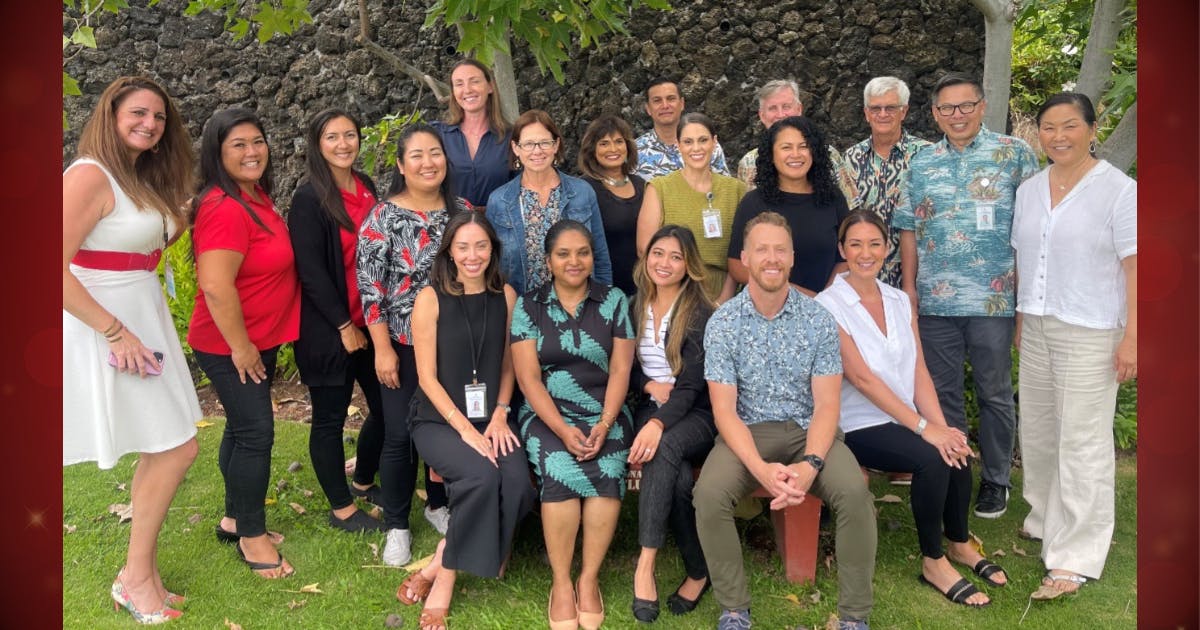
Omidyar Fellows Vicky Hanes, Chris Dods, and Stacy Ferreira
Cohort IX Fellows reflect back on this year and share their thoughts on gratitude.
Some responses have been edited for length and/or clarity.

Photo courtesy Vicky Hanes
As we lean into the season of giving and thanks, I’d like to offer some thoughts on the role of gratitude. Gratitude is a powerful, yet often overlooked, emotion that can have a deep effect on our locus of control and well-being, especially in the context of healthcare. At its core, gratitude is the practice of recognizing and appreciating the positive aspects of life, even during the most challenging and uncertain times. In healthcare, it plays a significant role, benefiting both patients and providers in profound ways. The operative concept here is the practice of gratitude, which is easier said than done. And, as with most practices, our ongoing efforts to practice gratitude will improve and optimize over time.
For patients, gratitude can transform the experience of illness and recovery. Facing a serious (or not so serious) medical condition can bring about feelings of fear, helplessness, uncertainty, or in mild cases, momentary annoyance. By practicing a sense of gratitude, patients can shift their focus from what they’ve lost or what they fear they may lose, to what they still have, whether it’s support from loved ones, access to quality healthcare, or the body’s capacity for healing. Studies have shown that individuals who practice gratitude experience reduced stress and anxiety, improved emotional resilience, and better physical health outcomes. This positive outlook can also contribute to improved adherence to treatment plans, as patients who are grateful for their care may be more motivated to engage in their own healing process. Hope is powerful medicine.
On the provider side, healthcare workers—doctors, psychologists, nurses, and dentists—often face intense emotional and physical demands. In a work setting that can sometimes feel overwhelming, practicing gratitude can help combat burnout and compassion fatigue. Acknowledging the positive impact they make on patients’ lives, even in small ways, can reinforce a sense of purpose and fulfillment. Gratitude fosters a sense of connection between healthcare providers and their patients, the community and their sense of purpose.
Furthermore, healthcare organizations that foster a culture of gratitude among their staff create a supportive environment that boosts morale, increases job satisfaction, and leads to better patient outcomes. At Hawaiʻi Island Community Health Center, we recognize the importance of employee wellness and the central role of giving thanks to those that we work with and work for. The appreciation we aim to express cultivates a cycle of positivity that ripples outward. Acknowledging the good in healthcare, even when faced with challenges, creates a culture of compassion and human connection that improves both patient care and provider well-being.
Chris Dods
The holiday season is a natural time to pause and reflect on the things that bring meaning and joy to our lives. In this season of giving thanks, I’m reminded of the value of practicing mindfulness and gratitude, not just during the holidays, but as an ongoing approach to navigating our lives and work.
We are living in a time of extraordinary change. The pace of transformation in our personal and professional lives is unprecedented, and projections suggest the pace of change will quadruple by 2030. While this may feel daunting, mindfulness and gratitude offer powerful tools to anchor ourselves amidst the swirl of change. These practices not only foster emotional resilience but also enhance our ability to engage thoughtfully with the challenges and opportunities around us.
In my own work, as we enter the season of annual reviews, I’ve witnessed firsthand how a gratitude-centered mindset has positively impacted relationships within my team. Before diving into constructive feedback, I have learned to make it a point to share two things I genuinely appreciate about the person being reviewed. It’s a practice that sets a tone of respect and acknowledgment, creating a space for honest, growth-oriented dialogue.
When it comes time to share areas for improvement, we’ve found that beginning with the phrase, “and you could be even more effective if…” helps reframe feedback as an opportunity for growth rather than criticism, underscoring our belief in one another’s potential which cultivates a culture of trust and collaboration.
At home, with a spouse and three children (and four dogs!), life often feels like a whirlwind of routines, commitments, and daily stresses. It’s so easy to get caught up in the rhythm of schedules and responsibilities that I sometimes forget to pause and reflect on what truly matters most: my family. Taking the time to intentionally reflect on what I am grateful for—especially the people I share my life with—has helped me realign my priorities and ensure I’m giving my best to those who matter most.
Just like in my professional life, expressing gratitude has become a practice I’ve tried to incorporate into my personal life. I’ve learned that my family, much like my work team, thrives on feeling seen and appreciated. Whether it’s my spouse for her unwavering support and partnership, or my children for their creativity, kindness, and energy, taking a moment to acknowledge what I love and admire about them creates deeper connections. It’s amazing how something as simple as saying, “I really appreciate how kind you were to your sister,” or “I love the way you handled that situation,” can brighten their day and strengthen our relationship.
Stacy Ferreira
The holiday season surrounds us, inviting a moment of reflection on the many blessings we experience—both big and small. This time of year reminds us to pause, give thanks, and connect with one another in gratitude and aloha.
Each morning as I prepare for work, my home fills with the sounds of my praise and worship playlist. The first song that always plays is "The Blessing" (listen here). It’s a powerful reminder of God’s everlasting promise, rooted in love and abundance, for our lives and the generations to come.

Photo courtesy Stacy Ferreira
In Numbers 6:22-26, God instructs Moses to teach Aaron and his sons how to bless the Israelites:
“The Lord bless you and keep you;
The Lord make His face shine on you and be gracious to you;
The Lord turn His face toward you and give you peace.”
This beautiful scripture reminds us that we carry within us the power to bestow blessings upon one another. While the world around us may feel uncertain, there is a constant within us: the ability to extend kindness, grace, and peace to those we encounter.
Gratitude transforms our perspective, allowing us to see even life’s simplest moments as divine gifts. Whether it’s the laughter of loved ones, the warmth of a morning sun, or the beauty of music that stirs the soul, each blessing is a reflection of God’s boundless love.
As we celebrate this season of giving thanks, may we also celebrate the opportunity to be a blessing to one another. Let us shine kindness and compassion in all we do, uplifting those around us with a spirit of aloha. In doing so, we create a ripple effect of gratitude and grace that can span generations.
May your holiday be filled with bliss, peace, and the joyful knowledge that you are deeply loved and blessed. Mahalo for being part of this incredible ‘ohana and may the spirit of the holidays inspire us to walk forward in gratitude and unity.
Hawai‘i Public Radio — The downtown Honolulu mural titled Kauluhakulau features Zane's iconic ʻulu print with the leaves and skin of the breadfruit.
